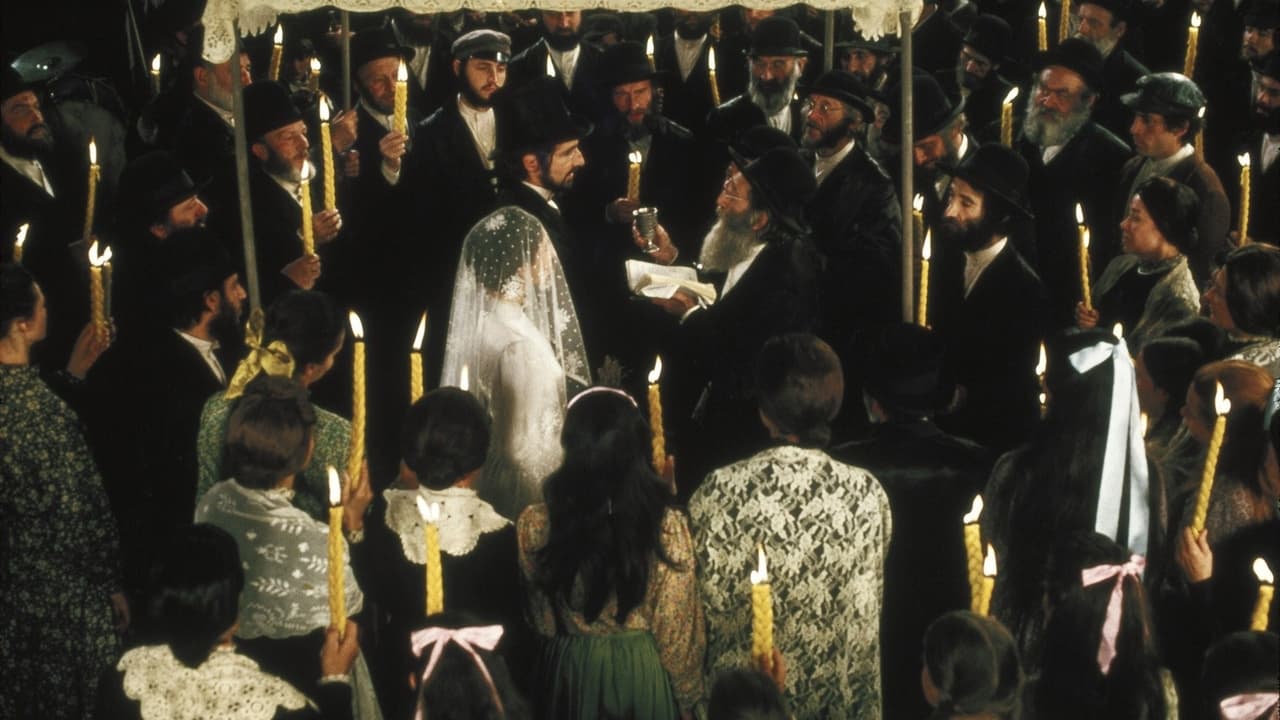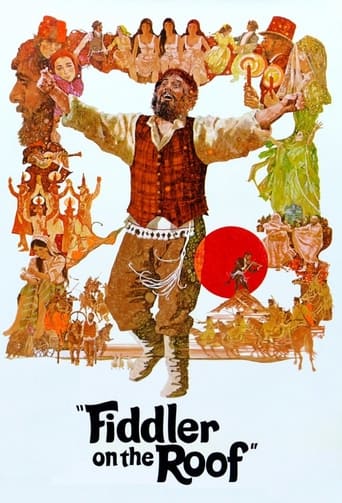pyrocitor
"It's hard to be Jewish, it's hard to be Jewish, it's hard to be Jewish in Russia, yo!" If this irreverent cutaway gag from TV's Community is indicative of Fiddler on the Roof's cultural presence in the 21st century (keeping in mind, this is the same generation that distilled Rent into "Everybody has Aids!" in 2004's cheerily crass Team America: World Police), it's a testament to how lovably unforgettable the story is to still incur such affectionate ribbing. But, endless revivals on and off Broadway aside, it's still primarily thanks to Norman Jewison's 1971 cinematic adaptation that the Fiddler flame continues to burn. The word 'timeless' is bandied about far too frivolously, but it's hard to find a more applicable candidate; more than 40 years after its release, the film is as infectiously watchable as ever. Furiously spirited and cunningly playful before revealing an underbelly of cavernous lamentation, Jewison's Fiddler on the Roof holds its place not only as one of the most unforgettable musicals of Classical Hollywood, but one of its most abiding, heartfelt delights. Like all the greatest musicals, Fiddler is timeless through its ability to translate an insightful glimpse into a specific sociocultural moment (the Russian-Jewish community uneasily navigating cultural persecution in pre-revolutionary Russia) into a swathe of universally relatable movie magic. From the opening number, where each reprise of "Tradition!!" brings more manic claustrophobia (thanks largely to Jewison's teasing editing, sonorously cutting between pieces of Jewish spiritual iconography to the beat), the film clearly establishes it will be doing everything in its power to poke at just that. Thankfully, the film's almost sitcom setup of each of beleaguered narrator Tevye's daughters (Rosalind Harris, Michele Marsh, & Neva Small; all slyly luminous scene-stealers) increasingly testing the boundaries of cultural transgression by marrying (gasp) for love always veers away from clichéd expectations enough to keep the film vibrantly unpredictable rather than the kind of saccharine staleness too many classical musicals dredge up. Instead, befitting the film's guiding metaphor, Jewison's directorial hand is steady as a rock. In spite of his film's voluminous run time and cascading emotional arc, balancing history, politics, and spirituality with humour, heart, and outrageously catchy musical numbers, Jewison's pacing is unflappably perfect. He finds an almost pristine level of cohesion, building each romantic crisis into the next in harmony with the brewing sociopolitical upheaval to circumvent any worries of episodic plotting. Similarly, his predilection towards the zaniness of his story not only infuses it with tremendous energy (just check out the expressionistic, ghostly insanity of Tevye's Dream to see Jewison's wackiness at full tilt), but makes the inevitable second half crash all the more agonizingly hopeless and despondent. Ahh, yes - that second half. Just as The Sound of Music is incomplete without its pesky Nazis, Fiddler's rumblings of "trouble in the city" come with eventual devastating consequence. Jewison wisely doesn't overplay the macro sociocultural turmoil, but merely sows seeds of revolt - a jab in the otherwise glib opening number ("we don't bother them, and so far they don't bother us"); a raucous engagement celebration turned heated cross-cultural dance battle, until escalating sharply with a bawdy matrimony turned hate crime arson. As silly as it gets, Jewison's Fiddler is just as unafraid to glare the horror of its historical atrocities straight in the face, until sputtering out with the crushing anticlimax of an enforced deportation, an ending too necessarily bleak to trivialize. Thankfully, Fiddler is too chock-full of unstoppably hummable tunes to ever become needlessly dour. The songs, naturally, are unforgettable enough to speak for themselves (though John Williams' rich, Oscar-winning background score does some considerable speaking of its own), so Jewison allows them to simply breathe, integrated into the narrative with such unceremonious muckiness that they feel all the more spontaneous and heartfelt when chirped by the mud-caked, visibly weary cast. In a more classical or more contemporary remake, the most iconic ballad, "If I Were a Rich Man," would be accompanied by deluges of glitzy Broadway production values and dazzling choreography. Under Jewison's grainy, no-bullsh*t 1970s sensibilities, it has Topol shimmying alone in a grungy barn, imitating the braying of the livestock surrounding him. Chicago or Broadway Melody this ain't, but it's all the more enthusiastically authentic for it.Still, if there's a single roof tile that keeps this Fiddler upright, it's the legendary performance of Topol. He doesn't so much play Tevye as allow him to ooze out of every pore. Every grunt from his entirely credible Russian accent, every exhausted sag or mischievous prance, every sheepish grin or world-weary grimace, every indignant booming of "TRADITION?!" is so effortless they seem worlds away from the affectations of an actor: this is a wholly fleshed out, loving, hurting, human being on screen in front of us, and we can't help but love him with the entirety of our hearts. The play's 'Tevye talking to the audience/God' conceit may have been a risky prospect to translate into film, but in Topol's effervescent hands, we're too delighted to be invited into his monologue to split hairs. Supporting him, Norma Crane proves both hilariously cantankerous and deeply sweet as Tevye's prickly wife Golde, and watching the two of them share an incredulously clumsy romantic duet is one of the most adorable moments ever committed to celluloid. Finally, Leonard Frey is hugely affable and goofy as the mousy suitor of Tevye and Golde's oldest daughter, while Starsky and Hutch's Paul Michael Glaser raises laughs aplenty as an endearingly self-righteous revolutionary turned romantic. Wonder of wonders, miracle of miracles - dispelling all fears of datedness, Fiddler on the Roof retains its worthy place as one of the essential, canonical movie musicals, sure to capture hearts and leave generations of audiences whistling "If I Were a Rich Man," no matter how they're prompted to experience it. After all, it IS, evidently, hard to be Jewish in Russia... yo. -10/10
g-bodyl
Fiddler on the Roof is a solid musical and is actually a little better than I anticipated. Set in pre-revolutionary Russia, this film describes the life of Jewish peasantry and how their way of life faces off against more modern times. I found the movie to be quite a learning experience, as my knowledge of Russian history really begins at the Bolshevik takeover. This is the earliest film I remember seeing of legendary composer, John Williams. He does a magnificent job adapting the music from stage to screen. I loved some of the songs such as "Tradition" and "If I was a rich man." For the most part, I loved the choreography. However, I was oddly bothered at some of the dancing, especially from Topol's character. It just didn't seem to strike a chord with me. I loved the production design and the cinematography. Despite its advancing age, the film still looks beautiful.Norman Jewison's film is a musical that takes place in pre-revolutionary Russia. A country that is struggling to modernize itself. Perhaps some of the reason is the Jewish peasants, who believe in their traditions. Tevye is a milkman who is poor and lives with his wife and five daughters. As the matchmaker suggests matches for his eldest daughters, Tevye has to deal with changing ways of life as his family attempts to break tradition.If you want to see a popular film that has a no-name cast, don't look further than this film. Until my initial viewing of this film, I have never heard of anyone in this cast. But I feel they all do reasonably well in their roles. Topol does a good job as Tevye. He looks to be an old man, but he was only in his 30's when this film was released. His singing was pretty good too. The pain he shows as he realizes tradition is crumbling all around him is pretty darn heart-breaking. The rest of the cast features unknown names such as Norma Crane as Golde, Tevye's wife and Leonard Frey as Motel, a lover of Tevye's eldest daughter.Overall, Fiddler on the Roof is an often entertaining musical filled with excellent songs and a score that puts the majestic John Williams on the map. The choreography is hit or miss and the film feels a little stretched. But the film does a good job in portraying peasant life during Czarist Russia and how difficult life can be for them, and how tradition unites their people. The beginning and end shots are beautiful, and what gives this movie the title it has. They are my favorite shots of the movie.My Grade: B+
alexcapogrosso
...I would watch this every day. And, I do watch it a lot. It is an amazing musical and my personal favorite. Topol is fantastic! While i admit the ending is sad (when they leave Anatevka), it is totally realistic. The songs are amazing, and I listen to them all the time. "Tradition' is my favorite, but there are other good ones as well. The movie is really long, over three hours, so you will need to set aside time to watch it. It probably doesn't need to be as long, but that is my only complaint, What a great movie! Totally worth watching in my opinion. If you get the chance, watch it. Believe me you won't be sorry.

